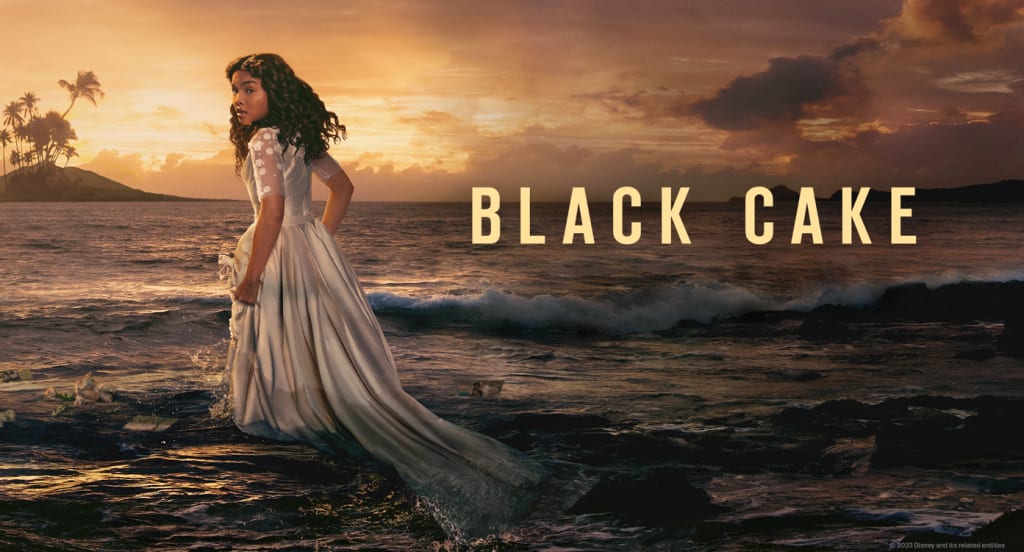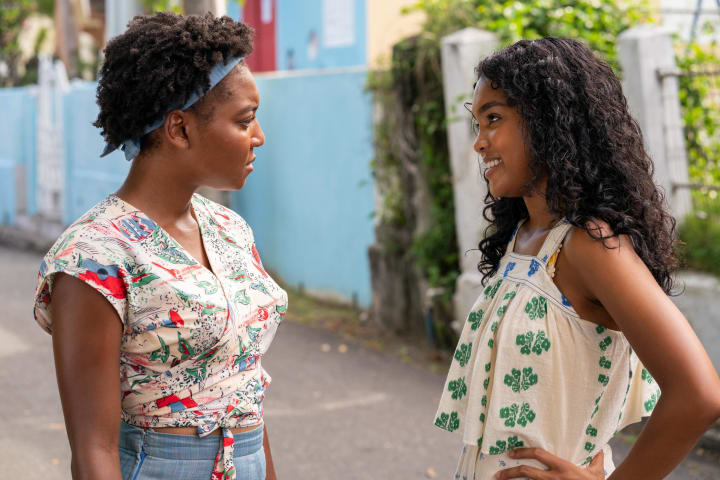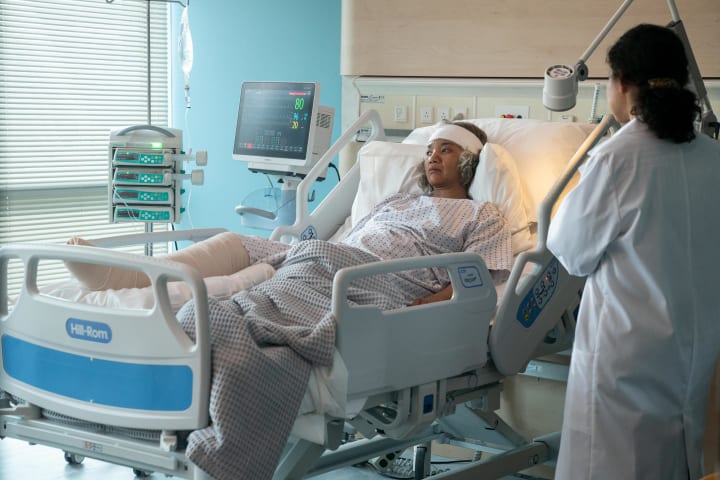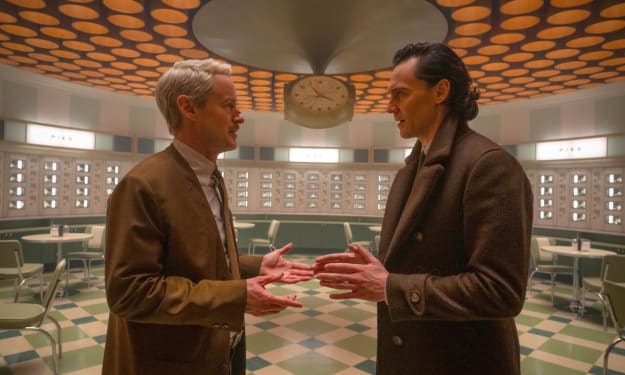Review – Black Cake Tells an Unconventional Story, But Suffers from Too Many Tropes
We follow the story of five generations affected by untold secrets

“Black Cake” opens with a young woman (Mia Isaac) running for her life in a wedding dress. It’s dark, and people are calling for her, but nothing stops her from racing away. That is, until, she reaches the shore—where will she go now?
Based on the 2022 novel of the same name by Charmaine Wilkerson, Disney+ (or Hulu, depending on your region) brings to the screen a story about a young girl whose life is derailed time and again, and the ways she tries to get it back on track. I received screeners for seven out of the eight episodes of “Black Cake”. Up until the finale, the story is told through a series of voice-over recordings made by Eleanor Bennett (Chipo Chung) and they slowly reveal Eleanor’s history, her journey across countries, and her secrets. These reveals have lasting impacts, especially on Eleanor’s family, who were unaware of how little they knew about her. The show derives its name from a specific kind of cake that plays a significant role in the story, one that unravels over the course of eight episodes.
“Black Cake” Delivers a Different Setting for Period Dramas

The Caribbean countries aren’t often settings for period dramas; and when they are, the local communities are hardly at the centre. That’s what makes “Black Cake” stand out from other stories—the central family in the past are the Lynncooks of Jamaica, made up of Chinese immigrant Lin (Simon Wan), his Jamaican wife Mathilda (Jade Eshete), and their daughter Covey. Covey loves swimming, and is hoping to compete at a big tournament alongside her bestie Bunny (Lashay Anderson), but Covey’s plans go sideways when the big bads of her small community come for her father, and his debts.
In the present timeline, we follow the Bennetts, whose Jamaican-origin matriarch, Eleanor, learns of her terminal illness, and her children, Byron (Ashley Thomas) and Benny (Adrienne Warren) must come together to listen to their mother’s dying recordings.
The show stresses how cultural, racial, and gender dynamics impact the lives of these characters; each character struggles through the discrimination they face, and it’s heightened by their own insecurities and interpersonal issues.
We constantly talk about diversity and inclusivity in entertainment media, and what a show like “Black Cake” demonstrates is that to capture the layers, depth and variations in experiences of the same family, you need to have the voices from those communities every step of the way. The show is adapted from a book written by a Caribbean-American woman, who called many countries home. The showrunner is Marissa Jo Cerar, who, in the press notes I received as part of the screeners package, explained how her personal history drew her into the story (I won’t give away the details as they’re spoiler-y).
Cerar notes “Our characters are more than “diverse.” They are aspirational, relatable, and complicated—and our show’s themes are far-reaching and intersectional.” And that comes to life in the complex characters we see on screen. They are not perfect or infallible, you will love them one minute, and want to shake them the next. But that’s the beauty of “Black Cake”, these characters are not a perfect minority, they are just people.
“Black Cake” is Undone by Relying on Too Many Cliches

Cliches are cliches because they happen so often, but there are ways to buck the trend or freshen up a cliché, but unfortunately, “Black Cake” doesn’t succeed here. I don’t know how much of the trope-filled nature of the show is straight out of the book, because I haven’t read it, but I can imagine the showrunner has made a faithful adaptation.
The book was snapped up by Oprah Winfrey’s production company (she’s an executive producer on the show) even before it was published. While I understand the interest, the downside of buying something sight-unseen is that the final product may fall short. I’m not saying the book does, but the tropes and contrivances in “Black Cake” really make it annoying to watch. It’s like everything and the kitchen sink get thrown at the protagonist in the story. The only difference is, the protagonist isn’t a white girl from England, like every other period story we’ve read. But that makes it worse—the protagonist is already on the run, and she’s different from everyone else, so burdening her with so many gender-specific challenges is too much.
The cracks in the story become more obvious partway through the season, and it’s heightened by the storytelling in the present. There are way too many tropes in the present timeline, and they undermine a far more intriguing story that arrives far too late in the season.
None of this is helped by the fact that “Black Cake” initially leans into being a murder mystery. But the mystery part is shelved to be more of a soap. People like soaps, and if that’s your jam, then “Black Cake” will definitely tickle your fancy. But for non-soap fans, the show is a little too melodramatic to watch, and even harder to enjoy. Nothing good happens to anyone in the seven episodes that I watched (that’s not a spoiler, I did warn you this is a soap), so that gets tiring. That’s not to say the things that happen to these characters don’t happen to real people, but when every bad thing happens over the course of seven 1-hour episodes, it’s a lot to take in.
Despite the melodrama and cliches, “Black Cake” is a refreshing change from the norm. The performances are solid, especially the actors who perfectly capture the Jamaican accents. The locales are stunning; this is a reminder why on-location shoots are such a delight. The vast array of experiences that the diverse and intersectional cast of characters face is hard to watch, but are an important reminder that marginalized communities aren’t a monolith, and hence do not behave in a specific way, nor do they behave in a perfect way. We see a kind of prejudice among the diverse communities in the show that isn’t told enough. We also witness insecurities and complications that are often reserved for white characters.
“Black Cake” isn’t perfect, but it is arresting, and a reminder that representation in front of and behind the scenes is imperative if we want to tell a range of stories and keep people coming back for more.
A note: This review is written during the 2023 SAG-AFTRA strikes, and the author supports the recommendations made by the actors’ union.
“Black Cake” is available on Hulu/Disney+ from November 1, 2023.
About the Creator
Monita Mohan
When not dreaming of a one-way trip to Coruscant, I'm usually staring at a blank page, hoping my articles write themselves.
Website: lightspeedwriter.wordpress.com
Twitter: @Monita_Mohan






Comments (1)
The book is definitely better than the show. As someone with a Jamaican mother, I can’t tell you that the accents are very bad! I don’t understand why they just can’t get actors of Jamaican decent to play these roles. There are so many around.